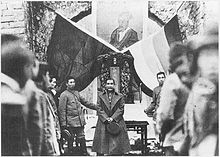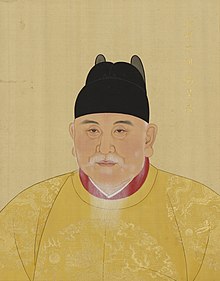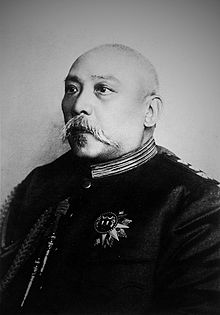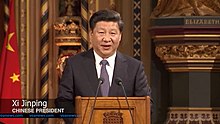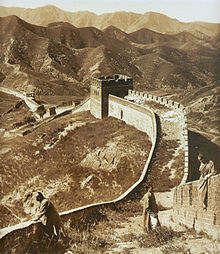Han nationalism
Han Chinese also constitute a sizable ethnic minority or plurality group in a number of other countries, such as Malaysia and Singapore.
Examples of this can be seen in previous Chinese invasions of Korea and Vietnam, and in historical conquests of Central Asia, Tibet, Xinjiang and Mongolia.
[10] Han Chinese nationalism was also integral to the rebellion against the Manchu Qing dynasty and became increasingly institutionalized following the Century of Humiliation.
These rebellions were often led by Han Chinese nationalists, including Sun Yat-sen, who considered the Manchu Qing dynasty corrupt and immoral, and took an aggressive stance against Western imperialism.
[14][15] Following the fall of the Qing dynasty, Sun Yat-sen attempted to build a more multi-ethnic form of Chinese nationalism.
[19] The PRC's notions of Han chauvinism and China as a multicultural state have been subjected to criticism, mainly by the western media.
[21] In post-Mao China, Han chauvinism has been recognized as a threat by successive generations of its leadership, including the administration of CCP General Secretary Xi Jinping.
The concept was first debated in the early 20th century; one of those who debated it was Zhang Taiyan, who strongly opposed the development of a multi-ethnic form of nationalism which was proposed by Yang Du and Liang Qichao, stressed the existence of the Han ethnic bloodline as evidence of the greatness of China and rejected the notion of a multiethnic China, being skeptical of non-Han ethnic groups like Manchus, Mongols, Tibetans and Turkic Muslims.
[24] There were, however, significant proponents of a multi-ethnic form of Chinese nationalism as well, and Tibet remained independent during the rule of the Republic of China.
Han migration dating back to the Qing dynasty led to the increasing sinicization of the region, which the policy further extended to ethnic relations.
[41] Inner Mongolia has been largely pacified since the 20th century, thanks to massive Han migration and intermarriage; Mongols have been perceived to be better integrated into the society than that of Uyghurs and Tibetans.
In 2004, then-Taiwanese Vice President and pro-Taiwan independence activist Annette Lu caused controversy by making Han-centric racist comments about Taiwanese indigenous peoples.
